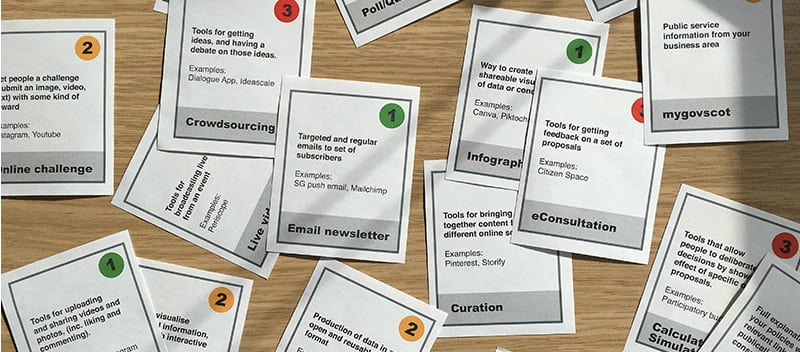Participation
Playing the digital engagement game
May 13, 2016 by Christian Storstein No Comments | Category Our work
We recently had an interesting workshop with colleagues in the Directorate for Economic Development, talking over the many different strands of their work, and identifying which could be ripe for development as a digital engagement exercise.
We staged the three hour session in four parts:
- Digital engagement – what is it?
- Project identification and selection
- Digital engagement strategy development
- Platforms, tools & activities (Digital Engagement Game)
I provided an overview of digital engagement, and the strategy template we have developed, as well as touching on examples of real approaches carried out by the Scottish Government and others (with thanks to Helpful Technology’s excellent site digitalengagement.info).
Strategy template:
We then broke into groups to find out what projects we might work on, wrote them up and pitched them – referring to some criteria to help our decision making:
- Value: Worth doing?
- Interest: Does anyone care?
- Incentive: What’s in it for them?
- Time: Are we early enough in the process?
- Resource: People, money – any?
After some enthusiastic pitches and a round of voting, we settled on three projects and then used three elements of the strategy (goals, audiences, incentives) to put a bit of flesh on the bones of the projects.
Finally we ran a version of the digital engagement game originally devised by Beth Kanter and David Wilcox, which was then updated by Dave Briggs. To make ours simpler, I didn’t sort the cards into categories, and didn’t include process and roles as Briggs had. Possibly to its detriment, but there was a lot to take in in the short time we had available. Anyway, here’s the cards I used:
We gave each team 12 points to ‘spend’, and the rule was that the strategy work (goals, audience and incentive) had to form the rationale for card selection. The points on each card indicated how resource intensive the tool or approach would be.
The aim was to get teams thinking of a project from its inception through to its implementation. By that measure, I think it was a success. The projects aren’t fully formed by any means, and the process and roles stuff – while absent from the exercise – will soon need to be worked through if the projects are to be successful.
Feedback
Initial feedback from the group was that more examples of how the tools and activities have been used in real life would be useful. I missed out some detail on evaluation because I thought the session was fairly ambitious to begin with, but it became clear that it was important to do some work on it.
I was very grateful that the teams were so enthusiastic, thoughtful and willing – it made it a great session. The success of a workshop like this is entirely down to the participants, and we were lucky in that regard.
We are planning to do more of these sessions, and we will report back on the projects that come out of them in the future.
Tags: audience incentive, digital engagement, strategy and evaluation


Leave a comment